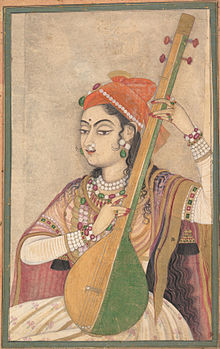Qawali
| Qawwali |
|---|
| Music of Pakistan | |
|---|---|
 |
|
| Genres | |
| Specific forms | |
| Religious music | |
| Ethnic music | |
| Other music | |
| Media and performance | |
| Music awards |
Hum Awards Lux Style Awards Nigar Awards Pakistan Media Awards ARY Film Awards |
| Music charts | Patari Haftanama |
| Music festivals |
All Pakistan Music Conference Lahore Music Meet Lok Virsa Mela |
| Music media |
Magazines Television Internet |
| Nationalistic and patriotic songs | |
| National anthem | Qaumi Taranah |
| Regional music | |
|
|
| Music of India | |
|---|---|

A Lady Playing the Tanpura, ca. 1735 (Rajasthan)
|
|
| Genres | |
|
|
| Media and performance | |
| Music awards | |
| Music festivals | |
| Music media | |
| Nationalistic and patriotic songs | |
| National anthem | Jana Gana Mana |
| Regional music | |
|
|
Qawwali (Nastaʿlīq: قوّالی) is a form of Sufi devotional music originated in India. It is popular in many parts of India including throughout North India, East India, Central India, Delhi, Hyderabad, and in Punjab and Sindh regions of Pakistan, and many parts of Bangladesh. It is part of a musical tradition that stretches back for more than 700 years.
Originally performed at Sufi shrines or dargahs throughout South Asia, it gained mainstream popularity and International audience in late 20th century. Qawwali music received international exposure through the work of the late Pakistani singers Nusrat Fateh Ali Khan and Sabri Brothers, largely due to several releases on the Real World label, followed by live appearances at WOMAD festivals. Other famous Qawwali singers include Pakistan's Amjad Farid Sabri, Fareed Ayyaz & Abu Muhammad, Rahat Fateh Ali Khan, Badar Maindad, Rizwan & Moazzam Duo, Bahauddin Qutbuddin and Aziz Mian.
...
Wikipedia
